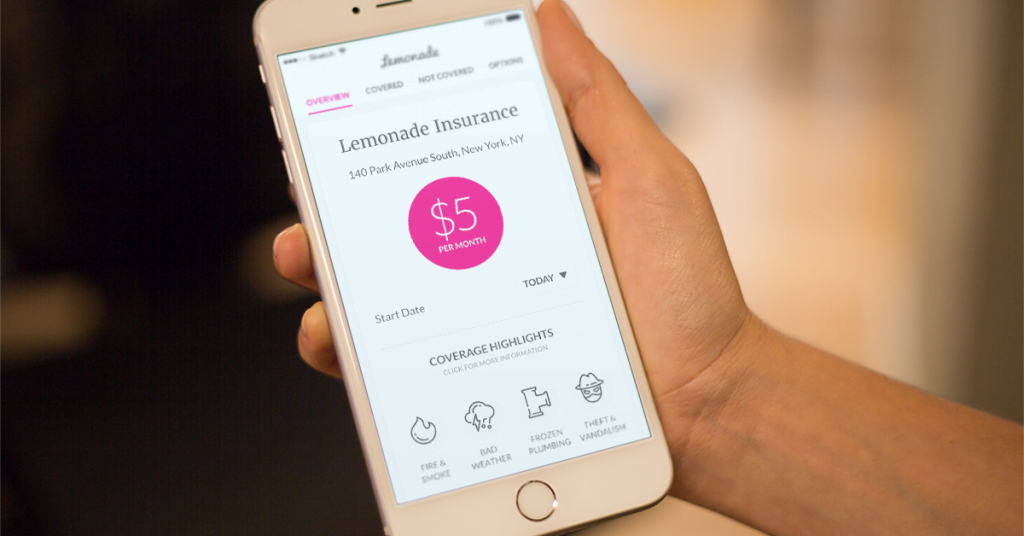There isn’t much that is interesting or “sexy” about insurance to the average person. So when a well-known celebrity publicly slammed the largest property insurance company in America on Twitter in defense of startups touting innovative tech solutions for the market, like Israeli-founded company Lemonade, people took notice.
US TV and movie star Ashton Kutcher, also a high-tech investor, was reacting to a major TV advertisement rolled out by State Farm insurance earlier this month appearing to mock the use of advanced technology and bots in the insurance market. The clip featured two prominent basketball players James Harden and Chris Paul from the Houston Rockets, and actor Oscar Nunez of “The Office” fame posing as a State Farm agent inspecting a damaged car belonging to one of the players. A robotic humanoid shows up from a company called InsuroBotz.biz and proceeds to suffer a number of technical malfunctions while attempting to handle the claim, pretending – and failing, of course, – to be human.
Criticizing the “cheap knockoff robots” created by the “budget insurance companies,” State Farm’s caption for the clip on YouTube read: “Nothing compares to an actual human being helping out whenever you need. Plus, humans won’t start crying weird AI tears all over your car.”
In a since deleted tweet, Kutcher hit back, saying “So basically this ad says you are getting killed by more efficient intelligent technical solutions like @lemonade_inc So your answer is to have 2 cool basketball players make fun of them? Is your marketing firm run by high school bullies @statefarm?”
Kutcher’s Sound Ventures is invested in Lemonade, which has raised some $180 million since it was founded in 2015 by entrepreneurs Shai Wininger, a co-founder of Fiverr.com, and Daniel Schreiber, former president of Powermat. Over the past several years, it has come to be billed as a major disruptive force in the property insurance market, combining behavioral economics, artificial intelligence and chatbots to deliver renters and homeowners insurance policies and handle claims for users in 19 states.
SEE ALSO: Why Israeli Startups Lead The Way In The Booming InsurTech Industry
While the insurance firm told NoCamels they would not elaborate further on the matter, Wininger took to Twitter in an unprecedented step, paying to promote State Farm’s ad by sponsoring it on YouTube and other social networks. “Today we’re making history. We’re running and paying for our competitor’s attacks ads – we’ve decided to pick up the tab and run it on our own dime,” he wrote.
This is the CRAZIEST thing we’ve done yet… (1/4)
— Shai Wininger (@shai_wininger) October 22, 2018
The tiff sparked a conversation surrounding the merits of disruption in an opaque, deeply bureaucratic insurance sector, and the role of technology – artificial intelligence, machine learning, big data analytics, and other tools – and how it can be leveraged not only to improve actual insurance work but also the customer’s experience.
“I’m not so interested in who will win the marketing fight or whose business model is better — though the two companies could probably sell tickets to the fight, along with a lot of popcorn,” Paul Carroll, editor-in-chief of Insurance Thought Leadership, a global network for insurance leaders, wrote in a blog post. “I’m very intrigued by how quickly technology should be integrated into interactions with customers.”
But while the insurance tech industry is growing at a rapid rate – a CB insight report this month unpacking the landscape says startups in the sector raised $2.56 billion in the first three quarters of 2018, up 50 percent from $1.7 billion in 2016 – it isn’t only the new companies, dubbed “new entrants,” like Lemonade that are making a splash within the sector. Even if America’s largest property insurer State Farm won’t fully get on board, there are plenty of traditional companies, or “incumbents,” that will.
Aktibo, an early-stage Israeli company, provides a customer intelligence platform for large life and health insurance firms to empower them with data analytics that help them better understand their customers.
“The basic assumption is that [the] disruption is being driven by data that the companies are not using,” Aktibo CEO and co-founder Yoav Shaham tells NoCamels, “We provide our customers with different data layers to enable better understanding and prediction as it pertains to key customer attributes. The notion is that different people have different needs and if you truly understand your customers, you will serve their needs better.”
Shaham won’t divulge the names of some Aktibo’s bigger clients that are embracing advanced tech, but he does say it’s generally taking insurance companies longer. This is because these companies are looking to protect their traditional businesses from digital disruption, although it’s unavoidable, he explains.
Insurance is also an industry with cumbersome regulations and outdated infrastructure, combined with a culture that prefers slow and steady growth, says Aviad Pinkovezky, head of product at Israeli InsurTech company Hippo.
“Many companies are just big and change is slow. Those companies have not been tech-driven for the most part and have only begun the transition to the online space,” he tells NoCamels. As an example, Pinkovezky points to US insurers who still have their customers answer long, complicated questionnaires to glean information about lifestyle and property, or ask agents to find out more about them rather than using available technology to do the work.

Illustrative: An insurance questionnaire. Photo via Deposit Photos
Hippo’s approach to home insurance predicts the customer’s insurance policy through the use of satellite imagery, sensors, and AI, which can work automatically to glean information about a client’s property.
Founded in 2015 by Assaf Wand and Eyal Navon, the company uses the data it receives to “change the paradigm of insurance,” Pinkovezky says. It also aims to revolutionize the home insurance process online, allowing users to get a quote in about 60 seconds rather than fill out a tedious questionnaire. With offices in California and Texas, the company is currently active in 13 US states and adding about one to two states every month, Pinkovezky says.
InsurTech is all about the customer, Israeli companies say
The importance of the customer is exactly what companies like Hippo and Lemonade are pursuing when they use artificial intelligence, machine learning, and even chatbots.
“Insurance fit for the 21st century means insurance powered by bots and data-driven algorithms, so that we can reach people in all corners of the globe,” Yael Wissner-Levy, head of communications and content at Lemonade, tells NoCamels, “Our customer in New York has so much in common with our potential customer in Tokyo and Rio. But it’s not just our tech that is global: Our mission of trust and transparency is universal as well and speaks volumes to those seeking an alternative to traditional carriers.”
The Israeli companies all appear to share the belief that the industry is going through a major overhaul to put the focus on the customer.
Yuval Baharav, a co-founder of early-stage VC fund State of Mind Ventures, which invests in insurance companies, calls it a market revolution. “Insurance companies never made the effort to support the customer,” Baharav tells NoCamels, “Now they are up against companies that do.”
According to Baharav, incumbents are using AI to automate the insurance process and compete against the new entrants, but in parallel, new insurance companies like Lemonade and Hippo are also using AI and other tech solutions to offer new products to customers, like personalized policies.
“I believe in the next 10 to 20 years, we will see companies saying ‘we don’t care what he wants to buy, we want to look at his lifestyle and build a policy around that person,'” Baharav explains.
“People [clients] don’t care about the exact nature of algorithms,” says Hippo’s Pinkovezky, “They want to make sure you press a button and get someone right away.”
SEE ALSO: More Multinationals Are Tapping Into Israel’s Fintech Ecosystem
“At the end of the day, the insurance industry will have to meet customers where they have to be met,” says Pinkovezsky, “They need to leverage tech to help the customer.”
Another customer-centric InsurTech company to blossom out of Israel is Palo Alto-based Next Insurance, which provides quick but comprehensive insurance to entrepreneurs and small businesses in an online, transparent process. Founded in 2016, it is now licensed in nine US states with hopes of expanding to all 50 in the coming years.
Alongside Lemonade, Next Insurance was recently named among 250 top fintech startups of 2018, according to CB Insights. In July, it raised $83 million in a Series B funding round led by US venture capital firm Redpoint Ventures with participation from Nationwide Insurance, Munich Re, American Express Ventures, Ribbit Capital, TLV Partners, SGVC and Zeev Ventures.
Israeli growth in the field
While a 2018 Global Insurance trends analysis report from multinational professional services firm Ernst & Young shows that the US still dominates the field, the Israeli InsurTech market has grown significantly.
According to a new fintech report released by Israeli NGO Start-Up Nation Central in September 2018, the number of Israeli companies in the InsurTech industry has doubled since 2015.
